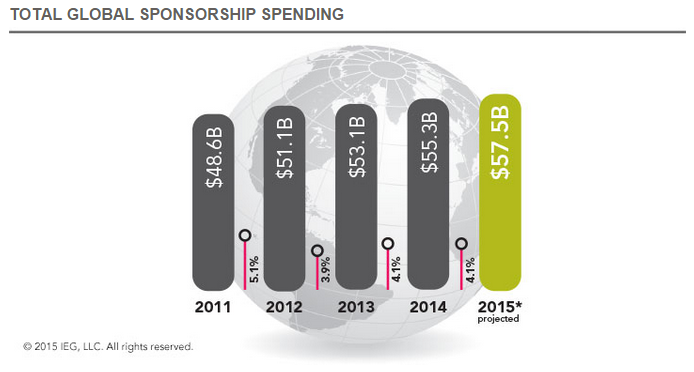Market Insight - Sponsorship Insight
Over the past decade sponsorship has been one of the biggest marketing disciplines and that trend is expected to continue. Research by IEG expects global spending on sponsorship to grow 5.2%. Globally, 2015 spending is forecast to rise 4.1% to $57.5 billion, matching 2014's growth rate.


A club rugby world record attendance of 83,761 enjoy an Aviva Premiership game at Wembley
- As with other disciplines, the rise of digital is at the heart of the switch from traditional TV consumption to online, time-shifted and mobile consumption, the emergence of emerging markets as the host nations of major global events, cause-related opportunities, and industry consolidation.
- Digital: Digital sponsorship is an important tool to meet the emerging demands both brands and consumers require; specifically, being able to understand real-time consumer sentiment and deliver a two-way conversation between brands and consumers. Sponsorships have traditionally been one-way and one-dimensional conversations. Consumers see a brand or logo, but previously had limited ways to reciprocate and interact. Digital sponsorships allow brands to drive direct and personal engagement among consumers – leading to programs which are more effectively executed and evaluated
-
Emerging Markets: Over the past decade, emerging markets have become an increasingly important arena for sponsorship opportunities, especially for sports. Both FIFA, the IOC and Formula One have awarded host-country status to emerging market countries. Emerging nations are very aware of the opportunity that such events provide to popularize the case for external investment and promote national social cohesion, which are some of the key values for both FIFA and the IOC. In turn, these countries and their growing populations are attractive audiences for marketers looking to showcase their brands to potential new consumers. Look look back no further than China’s 2008 Summer Olympic campaign, or at the success of BRIC countries becoming the host nations for major global sports properties including Brazil’s successful FIFA World Cup 2014 and Olympic bid for 2016, and Russia’s 2014 Winter Olympics and FIFA World Cup in 2018 to see how important emerging markets will be for future sponsorship opportunities
|
 
|
 |
Sponsorship is a cash and/or in-kind fee paid to a property (typically in sports, arts, entertainment or causes) in return for access to the exploitable commercial potential associated with that property
While the sponsee (property being sponsored) may be non-profit, unlike philanthropy, sponsorship is done with the expectation of a commercial return.
|
- Sponsorships provide the right to interact with their audience up to and through an event rather than just at the end point. Brands have realized that to drive engagement they need to enhance the consumers’ experience, and from there they see the development of relationships with their customers
- Done well, such sponsorships or ‘partnerships’ allow companies to strike up a two-way dialogue with target audiences and convey their unique characteristics, which in turn help differentiate their brand from competitors
- Sponsorship has become a platform to drive emotional brand engagement where the consumer is more receptive to developing a relationship with a brand that shares their passion and interests
- Sponsorship is currently evolving due to interactivity offered by digital communications, the rise of emerging markets, and the desire for greater integration with PR programs
- Historically sponsorship consisted of identifying properties (typically sporting and cultural events, TV programs, and print media) with relatively attractive demographics and developing a campaign to raise brand awareness among those audiences
- The majority of brands have historically been happy to buy this off-the-shelf inventory to guarantee exposure rather than engagement. Rights-holders also benefited from these programs being easy-to-bundle and easy-to-deliver
- But in today’s fragmented media climate, smart brands realise they need more tailored features as part of their sponsorship programs
- Sponsorship can be very flexible and could, in theory, be used to successfully target any audience.
- Brands just need to make sure they choose a property which the audience they want to target is passionate about.
Back to Market Insight